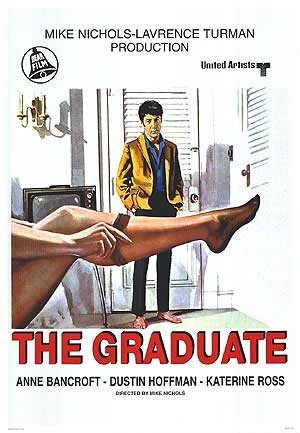Some movies are like a time capsule to
another time. The Graduate, once
praised for its anti-establishment message of battle in the
generation gap, now comes across as shallow and clueless. While the
film still does a number of things very well and holds up in a
variety of ways, the main thrust of the film no longer sticks the
landing. So it has become a film lost in time, one which can be
appreciated for it's technical and artistic achievements, but with a
message that simply isn't conveyed in the way it once was simply
because the context of the film has changed since 1967. At this time,
American culture was divided between the older and younger
generations. The old folks were adamant about sticking to the status
quo, while the young people wanted to do their own thing and stick it
to the man. This movie sides with young crowd by delivering a message
of doing your own thing in the face of the old establishment, but it
does so which such zeal that it ignores to base that message on
anything other than the sake of that very message.
Dustin Hoffman
plays Benjamin Braddock, a recent college graduate with academic
honors as well as notable extra-curricular achievements, notably on
the track team and school newspaper. At Braddock's graduation party,
Mrs. Robinson (Anne Bancroft), the wife of his father's business partner asks him to
drive her home, where she attempts to seduce him. Braddock won't have
any of it at first, and tries desperately to leave, however, after a
few days of thinking it over, Braddock decides to take up Mrs.
Robinson on her offer and the two of them begin an affair that lasts
well into the summer. Mr. and Mrs. Braddock encourage Ben to start
looking for a job or at least to ask out the Robinson's daughter,
Elaine. Mrs. Robinson is very much against Ben asking her daughter
out, but Mr. and Mrs. Braddock more or less force Benjamin's hand.
After some initial bumps in the road, the two youngsters hit it off,
but it isn't long before Elaine learns about her mother and Ben's
secret and the two part ways. Elaine goes back to school at Berkeley.
Ben becomes determined to go after her and win her back, but has many
obstacles to overcome.
The issue here is
that the film tries to make Mrs. Robinson into the bad guy. Sure, she
seduces Benjamin, but Benjamin is just as much at fault for taking
her up on the offer. Where things take a turn is when it comes to
Elaine. Despite hitting it off on their first date, they never share
any meaningful time together. They never have any significant
conversation about Ben's relationship with her mother, she just
accepts his story because her mother is such a terrible person.
Elaine even agrees to marry a different guy because her parents would
be furious if she didn't. Why does Braddock want to be with her
again? Mrs. Robinson comes across as the only rational character in
this movie and she shouldn't be considered the villain simply because
of her age. The film does, however, do a number of things very well.
Firstly, Dustin Hoffman is magnificent as Benjamin Braddock, his
transformation from a nervous do-gooder to a uncaring ne'er-do-well
is superb, as is his mania in his frenzied search for Elaine's
wedding at the end of the film. This movie also has incredible
cinematography and editing. Some of the angles used are more
experimental than others and don't work effectively but the ones that
do are very striking, most of all the shot that frames Benjamin
underneath the extended leg of Mrs. Robinson. The editing also blends
a number of shots together creating a wonderful montage of the
passage of time during the affair. I haven't yet mentioned the
soundtrack. Consisting entirely of Simon and Garfunkel songs, the
soundtrack is one of the most memorable of all time. Their haunting
harmonies guitar chords perfectly fit the context of the film, even
if they are overused just a tad. While this film's main message
doesn't hold up with time, this movie is still worth a watch, not
only to get an understanding of American culture during the sixties,
but also to see some excellent technical achievements.


No comments:
Post a Comment